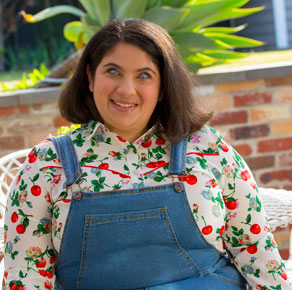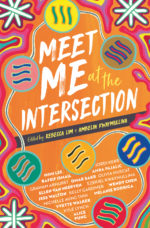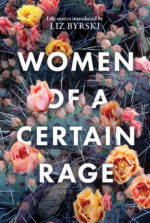Olivia Muscat on writing, disability and diversity in the classroom

Meet Me at the Intersection contributor Olivia Muscat was 13 when she began to lose her sight. Here she talks about how the Harry Potter series defined a pivotal moment in her life, coming to terms with being different and ways in which teachers can work with difference and disability in the classroom.
In Meet Met at the Intersection you write about your own life in the context of the Harry Potter series. What meaning do those books hold for you?
I’m not as much of an avid fan of the Harry Potter books as I once was. But as a 13-year-old, I was slightly (read, very) obsessed. The moment that the last book was released holds great significance for me both as a fan and as a person. It symbolises for me the moment when I truly realised my level of vision was declining.
But it also has positive connotations. When I realised I couldn’t read the print, my family, friends and school all rallied around and supported me. My school library bought the audio book immediately, and my dad, a few of my friends and my English teacher all took time out of their lives to read me chapters at a time. So although it was a sad time for me, it also showed me how loved I was and made me feel as if I didn’t have to face these new challenges alone.
I still occasionally revisit the Harry Potter books and films, and though my level of devotion isn’t as wild as it was, I still have a great fondness for the world of Hogwarts. I’ll happily weigh in on any Harry Potter related debate, and I have a replica of the Marauder’s Map above my desk.
Did you ever think you would become a published author? Has having your story included in Meet Me at the Intersection changed your life in any way?
I’m not sure I ever really thought I’d be a published author. It always seemed like this impossible, intangible dream. I knew it happened for people, I just never thought I’d be lucky enough to be one of them.
Being included in Meet Me at the Intersection has made me realise that there are actually people out there who are interested in what I have to say. It has opened up new opportunities and relationships that I know will be really valuable in the future, and has made me realise that I can actually handle other people reading my work. It has boosted my confidence like nothing else could have. I am so grateful that such a beautiful book exists, and that my little story is among its pages.
In your story you talk about the fight you faced within yourself to feel that it was okay to be different. Is that still a process you’re going through?
I think at this stage in my life I’m very okay with who I am. My fight is more with making the world around me a more accessible and inclusive place for everyone who is different. I’m comfortable with being different and I want others to be comfortable with that as well.
Have you found social media platforms to be a help or a hindrance when discussing ideas of difference and diversity?
That’s a difficult question. Anyone can express their opinion on social media, and while that’s great for giving a platform to people from diverse backgrounds, it also is a breeding ground for harmful opinions and portrayals, particularly of people living with a disability.
But overall it’s fantastic for giving a voice to people who otherwise wouldn’t get heard, and also for making connections with other people who may be having similar experiences. I’ve been able to both learn from and educate others through social media platforms, so it’s hard not to see that as a positive.
Is there anything you can do now that you wouldn’t have been able to do before you lost your sight?
I don’t think there’s any specific activity that I’m able to do now that I couldn’t before. I’d say I have more empathy for others, and am much more aware of the difference I can make in the world, but that could also be to do with becoming an adult and all the life experiences I’ve had since I lost my sight.
Though I am really good at walking around in the dark without hitting anything.
What can schools and teachers do, in your opinion, to ensure that students with disabilities feel included in the classroom?
I’d say that teachers don’t need to constantly point out a student’s difference. Don’t make an example of them. A few times my teachers said to the class, ‘If Olivia can do it, none of the rest of you should complain.’ That may seem like inclusion, but it’s uncomfortable and harmful for everyone involved.
Making sure all activities and classwork are as accessible as possible to everyone in the class is a great thing to do, whether that’s making sure there’s a braille or electronic copy of worksheets and texts, or ensuring that places where you take your class on trips or excursions have disabled access. Schools may need to consult the student on some accessibility matters, but never assume it isn’t possible.
Try and organise these things in advance too. There was nothing worse for me at school than when teachers tried to come up with a way to include me at the last minute. It made me feel like an afterthought, and felt like it didn’t really matter to them whether I was involved or not.
Students with disabilities just want the same chances and opportunities as everyone else. They may access them in a slightly different way, but that’s okay, and they should never be made to feel as if they are a burden.
Can you suggest any activities or discussion topics that teachers might be able to use to facilitate a greater sense of inclusion for those with disabilities?
Not specifically, but if the subject of disability comes up, attention doesn’t need to be drawn to the student with a disability.
If an individual student wants the chance to talk about their experience, they should be given the chance to do so. But if they’re not comfortable, or just don’t want to talk about it, then they shouldn’t have to either.
Also, if the chance to study a text with positive representation of disability or difference comes up, definitely take it. Children will follow the lead of the people around them. If adults don’t make a huge fuss over a disabled student, and just work to include them without making an issue or a production of it, then it’s more likely that fellow students will learn to take disability in their stride and also include their disabled peers without it being seen as some sort of community service.
What advice would you give to aspiring writers who have a disability? Or those who, like you, are struggling to understand whether it’s okay to be different?
My advice would be to remember that you don’t owe anything to anybody. If you want to write about disability, then go for it. If you want to write about dragons or fairies or racing cars or shopping, then go for it. But also remember that including disabled characters is okay. In fact, it’s awesome! People with disabilities exist and their stories should be told.
I’m not sure I have advice for people who might be struggling to understand whether it’s okay to be different, because that’s their struggle and it’s a very personal thing.
Maybe I’d like to tell them that being different can be hard, but it can also be awesome fun. Every human is different. That’s what makes us human. Find your people, whether that’s in real life or on the internet, or in books, or in film, and keep doing the stuff that makes you happy.
Meet Me at the Intersection edited by Ambelin Kwaymullina and Rebecca Lim is available from all good bookstores and online at www.fremantlepress.com.au




